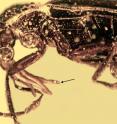Beetles pollinated orchids millions of year ago, fossil evidence shows
When most people hear the word "pollinator," they think of bees and butterflies. However, certain beetles are known to pollinate plants as well, and new fossil evidence indicates that they were doing so 20 million years ago. A new study in American Entomologist by George Poinar, Jr. (Oregon State University) describes beetles found in fossilized amber with orchid pollen in their mouthparts.
"My paper points out that beetles may play a more important role in pollinating orchids than originally thought, and that they have been doing so for some 20 million years," Poinar said.
Some present-day beetles use orchids for nectar, but no fossil evidence has ever been found showing beetles in the evolutionary past pollinating orchids -- until now.
The first specimen was a hidden-snout beetle (subfamily Cryptorhynchinae) found in amber from the Dominican Republic. This Dominican specimen had pollinaria from an orchid described as Cylindrocites browni attached to its thorax. The other specimen was a toe-winged beetle (family Ptilodactylidae) that was found in amber from Mexico. This toe-winged beetle had pollinaria from an orchid described as Annulites mexicana attached to its mouthparts.
The beetle in Dominican amber was estimated to be from 20 to 45 million years old, and the beetle in Mexican amber was in strata estimated to be from 22 to 26 million years old.
While other beetles are known to pollinate plants, no current-day hidden-snout beetles have been seen visiting orchid plants, and no current-day toe-winged beetles have been seen with pollinaria.
According to Poinar, the reason may lie in the beetles' secretive behavior, which makes it difficult to collect data about them.
"While no present-day cryptorhynchid weevils or ptilodactyline beetles are known to carry pollinaria, past and future collections of these and other beetles should be examined to search for attached pollinaria," Poinar said. "Orchids may have evolved beneficial associations with a much wider range of beetles and other insects than we thought possible."
Source: Entomological Society of America
Other sources
- Beetles pollinated orchids millions of year ago, fossil evidence showsfrom Biology News NetMon, 22 Aug 2016, 23:01:46 UTC
- Beetles pollinated orchids some 20 million years agofrom UPIMon, 22 Aug 2016, 21:01:27 UTC
- Beetles pollinated orchids millions of year ago, fossil evidence showsfrom Science DailyMon, 22 Aug 2016, 15:11:20 UTC
- Beetles pollinated orchids millions of year ago, fossil evidence showsfrom PhysorgMon, 22 Aug 2016, 14:01:15 UTC
